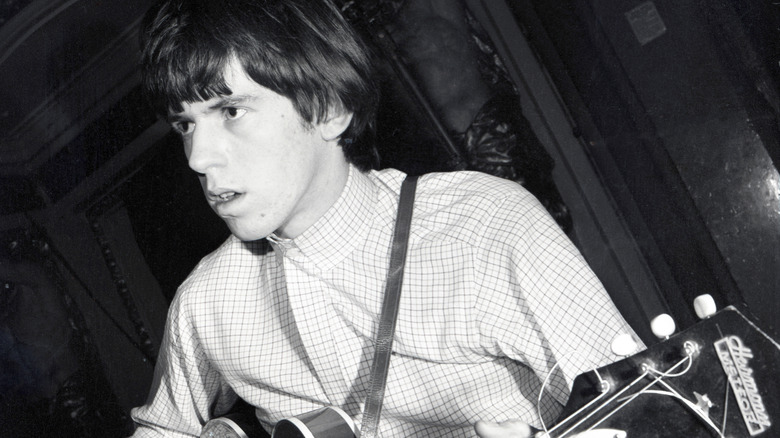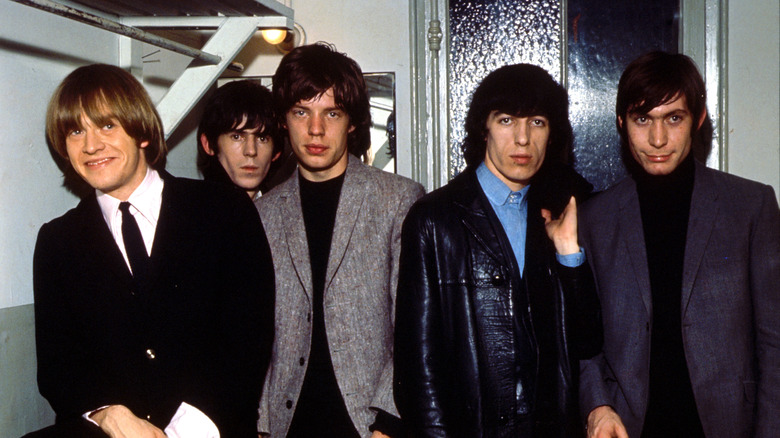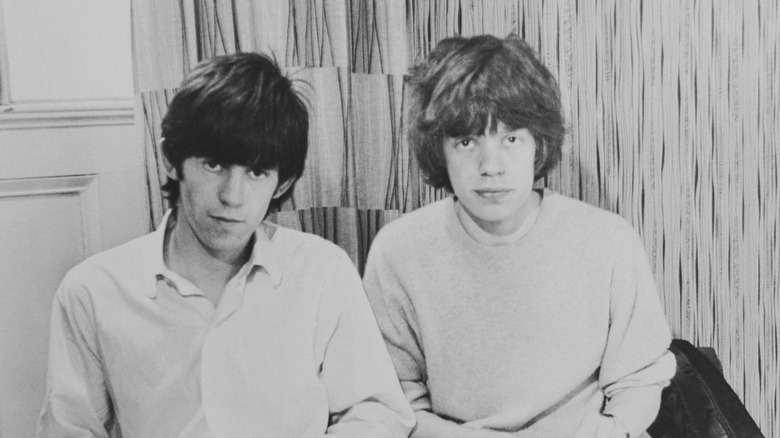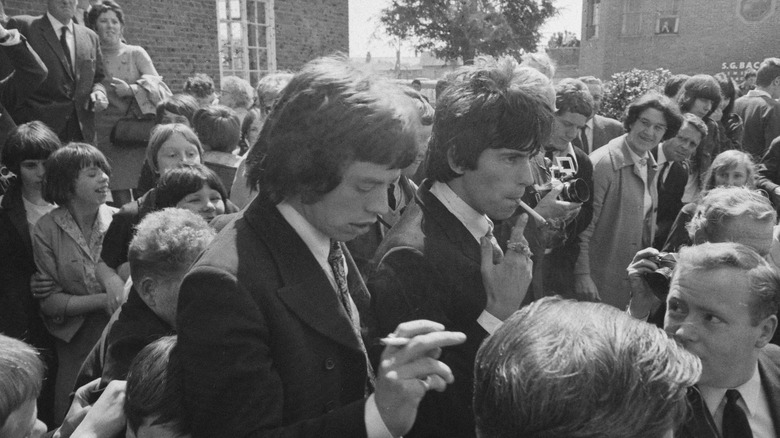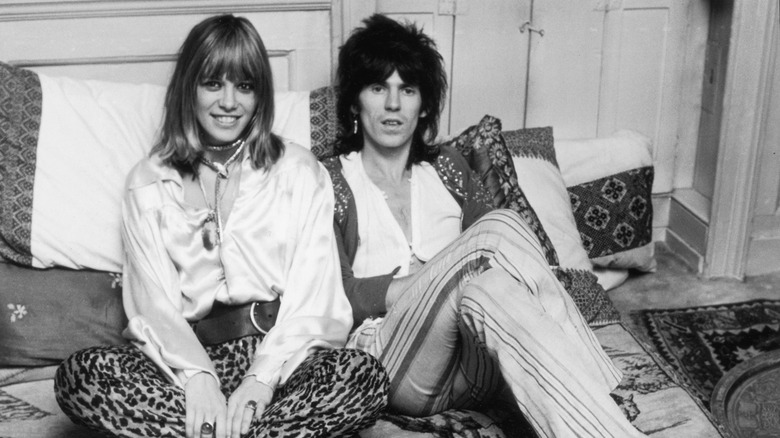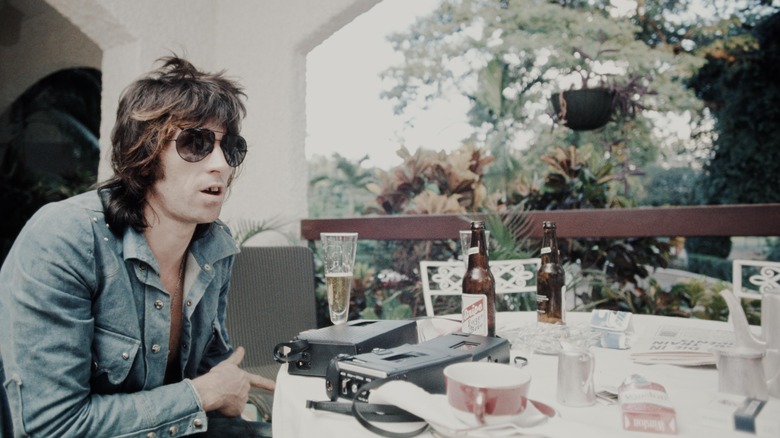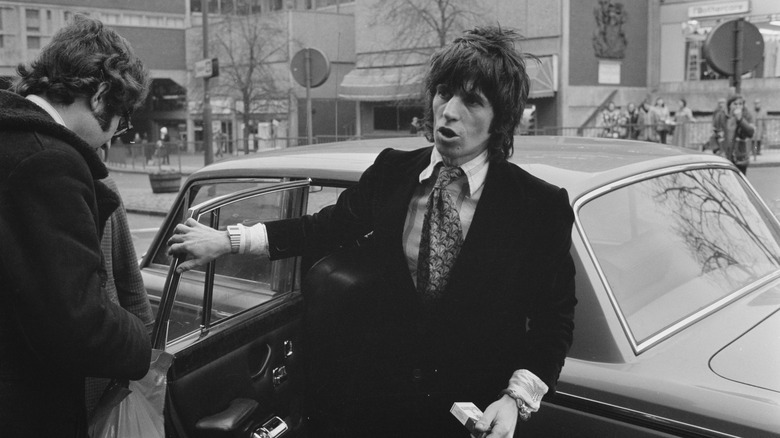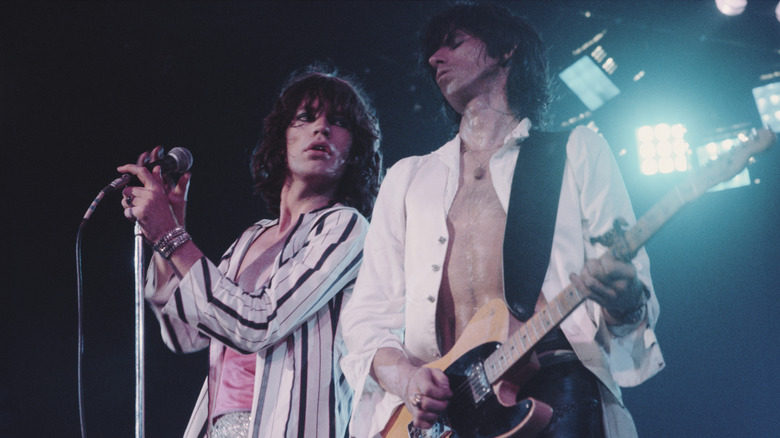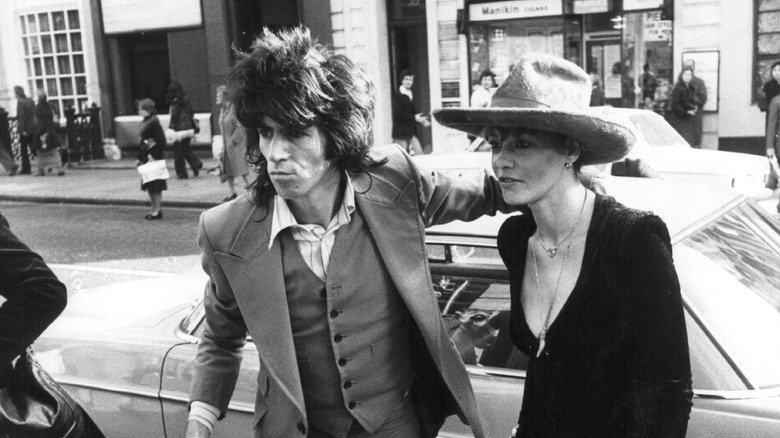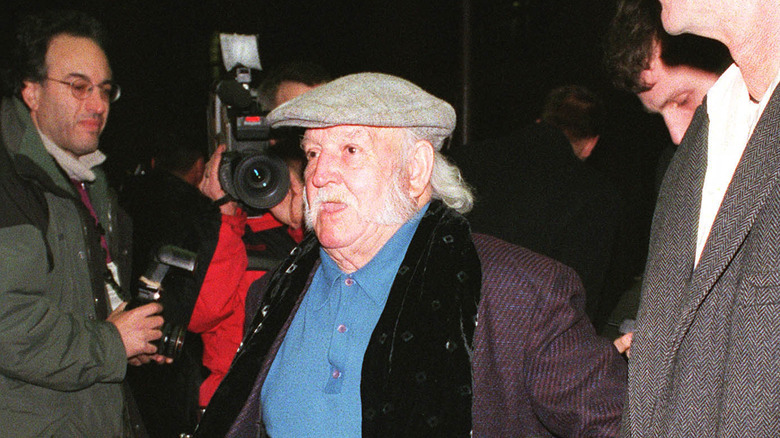What You Didn't Know About Keith Richards
Keith Richards earned his place in rock history by playing guitar and writing songs for the Rolling Stones. Per The Guardian, it was Richards's grandfather, who played in a jazz band, who gave him a love of music — as well as his first guitar. As an angel-faced 12-year-old, Richards joined two other boys from Dartford Tech in a trio that performed for the Queen at Westminster Abbey. "We were the three best sopranos in the South East," he later told the Radio Times. Their career as vocalists came to an end once puberty hit, however, and Dartford Tech insisted that all three boys retake all the schoolwork they had avoided due to concerts.
"All these gold cups and awards for the choir, and they strew them around the assembly hall, and then we were just like ftttphhttrrrp – squelched! It wasn't fair," Richards argued, reflecting on how the school sparked his anti-establishment streak. "But that was when the idea of rebellion took seed. Before that it was all, 'Yes sir, no sir.' But around then, it changed. Like, 'Maybe we can carve a new path here...' "
All three boys started trying to get themselves expelled. Eventually, Richards succeeded and went on to an art school, before reconnecting with a childhood schoolmate and fellow blues fan called Mick Jagger. Keep reading to discover more about the guitarist's rise to fame.
He was estranged from his dad for 20 years
Although he had grown up with both parents in Dartford, Keith Richards lost touch with his father after they divorced, at the same time that the young musician dropped out of art school and joined the Rolling Stones. "For twenty years we had no contact whatsoever," Richards told The Mirror in 2015, revealing that he was the one to reach out after years of silence. "In '81, '82 , I sent a note saying 'why haven't we seen each other for so long.'" When they finally reconnected, the rocker brought a fellow Stone along with him for moral support.
"So my dad comes down to my house and I had taken Ronnie Wood with me because I wanted protection — to meet my dad after twenty years," Richards reflected, admitting that he was "scared sh**less." Once he saw the "little old bloke" in person, however, they clicked right away.
The guitarist also revealed that his father, who had been a factory worker for most of his life per The Guardian, could easily keep up with the band's partying. "He liked his rum but the truth was he could drink us all under the table, it was amazing," Richards commented.
He set up a recording studio in his bathroom
Before the Rolling Stones found fame and fortune, the band's early days were not glamorous. As NME reported, Keith Richards moved in with Mick Jagger and Brian Jones, as well as their flatmate James Phelge, after they formed the Stones. Although the band was only picking up the odd gigs at London clubs, all three men rejected the idea of regular day jobs to focus on their music, performing covers of the American blues that they loved.
Their living conditions at 102 Edith Grove were squalid and unhygienic, per The Telegraph. Richards himself described the flat as "truly disgusting" in his autobiography "Life," recalling "the substances growing out of the crockery, the greasy, cold pans piled in junked pyramids of foulness that no one could bear to touch."
In order to help their career, the three musicians set up an amateur recording studio in the flat's bathroom. According to Reuters, they thought the sound of the toilet flushing was similar to applause.
He dreamt up (I Can't Get No) Satisfaction in the middle of the night
Keith Richards and Mick Jagger's career as a songwriting duo began after their manager took extreme measures.
As the guitarist revealed to Mark Hodkinson in "Marianne Faithfull: As Years Go By," the band started out by only performing and recording covers. "So what Andrew Oldham did was lock us up in the kitchen for a night and say, 'Don't come out without a song," he recalled, adding that the first song they ever came up with, "As Tears Go By," was given away to Jagger's girlfriend Marianne Faithfull.
The true moment of divine inspiration, however, came when Richards heard a signature riff in his dreams and woke up to grab his tape recorder. According to Rolling Stone, the ensuing song, "(I Can't Get No) Satisfaction" introduced the band to the American public and gave them their first US number-one single. "That was the most superb, lucky song ever," the guitarist later told GQ. "No, I've never quite dreamt up another one in the middle of the night. But that was very early days for me writing, and just the idea that that could actually happen was incredible."
He was too high to recognize the police during his 1967 arrest
The Rolling Stones became a symbol of anti-establishment rebellion when Keith Richards and Mick Jagger were arrested in 1967.
Richards wasn't sober enough to understand the gravity of the situation when police descended on his Redlands estate, however. "There is a knock at the door, I look through the window and there's this whole lot of dwarves outside, but they're all wearing the same clothes," he wrote in his book "Life." "They just looked like very small people wearing dark blue, with shiny bits and helmets."
When the police burst in to find a compromising scene, complete with a naked Marianne Faithfull under a fur rug, Richards didn't panic. "As far as I remember, the atmosphere was fairly relaxed at the time. S**t, anything we'd done, we'd done already," he noted. In the end, the raid resulted in Richards receiving a prison sentence of one year, which was later overturned following a public "outcry" as The Guardian reported.
He 'stole' Anita Pallenberg from bandmate Brian Jones
During the '60s and '70s, Keith Richards and his long-term girlfriend, Anita Pallenberg, were one of the most iconic couples of the music world. But when they first met, she was romantically involved with his bandmate Brian Jones.
'I've always loved the blues and Brian especially was a real blues man," Pallenberg later reminisced in an interview with The Guardian, recalling how she met Jones at a 1965 concert in Munich and went back to his hotel room. Their relationship was violent and turbulent, however. During one holiday in Morocco, Richards witnessed Jones being physically abusive towards Pallenberg and decided to intervene. He drove her to safety and the pair fell for each other. "It's said that I stole her," Richards later wrote in "Life." "But my take on it is that I rescued her."
"She had almost nothing but turbulent, abusive relationships," Richards reflected in his autobiography, noting that Jones and Pallenberg "had always been fighting, she running away screaming, being chased, in tears." Although Jones reportedly never forgave him, Richards maintained that he had done the right thing that night. "She had been used to this for so long, it was almost reassuring and normal. It's not easy to get out of those destructive relationships, to know how to end them."
If you or someone you know is dealing with domestic abuse, you can call the National Domestic Violence Hotline at 1−800−799−7233. You can also find more information, resources, and support at their website.
He nearly burned down the Playboy Mansion
Keith Richards has always had a reputation for drug-fuelled mischief. And in 1972, one of his misadventures almost led to the Playboy Mansion burning to the ground.
During a tour of North America, the Rolling Stones had been invited to stay at Hugh Hefner's infamous party palace. "We managed to set a bathroom on fire," Richards candidly admitted to NPR in 2015, adding that they "didn't notice the curtains had caught fire while we were just sitting around on the john, smoking."
In his autobiography "Life," the guitarist revealed that the culprits were him and saxophonist Bobby Keys, blaming it on the drugs they had been smoking. "And at a certain point... talk about hazy, or foggy, Bobby says, 'It's smoky in here.' And I'm looking at Bobby and can't see him," Richards wrote. "And the drapes are smoldering away; everything was just about to go off big-time." Suddenly, the musicians heard a "thumping on the door," before a rescue team of waiters busted in, bringing water to douse the fire. "They get the door open and we're sitting on the floor, our pupils very pinned," Richards recalled. "I said, 'We could have done that ourselves. How dare you burst in on our private affair?'"
He played a concert for the blind to avoid prison
Keith Richards had another brush with the law in 1977 but managed to avoid any prison time through an unconventional sentence. The rockstar was caught with 22 grams of heroin at a Canadian hotel, according to the Toronto Star. His lawyer told the judge that Richards was going through treatment for his various addictions, describing him as a "creative tortured person." In his autobiography "Life," Richards revealed that a blind Rolling Stones fan also spoke on his behalf, sharing what the band had done for him over the years.
The judge was won over and declared that "no incarceration or fine would be appropriate because of Mr. Richards' continuing treatment for drug addiction and his long-term benefit to the community." The guitarist was instead put on probation and ordered to "give a special performance at the Canadian National Institute for the Blind” within six months, a request which the band fulfilled in 1979.
"I feel good about it, obviously," Richards commented, quipping that his bandmates "were pissed off I was not put away for a couple of years." Although this arrest did lead to the legendary hedonist quitting heroin, Richards kept taking cocaine for decades, which has led to investigations into the rocker's high tolerance for drugs. "He must have the constitution of an ox," addiction expert Dr. Robert Lefever told the BBC. "Whether it's genetic or because he's built up a tolerance, he does seem to have an unusually resilient constitution."
If you or anyone you know is struggling with addiction issues, help is available. Visit the Substance Abuse and Mental Health Services Administration website or contact SAMHSA's National Helpline at 1-800-662-HELP (4357).
His nickname for Mick Jagger was 'Brenda'
Keith Richards and Mick Jagger are one of the music world's most iconic pairs, but their relationship has been through infamous stormy periods. As Richards revealed in his autobiography "Life," the other members of the Rolling Stones would call the frontman "Brenda, or Her Majesty, or just Madam" whenever he became "unbearable" to work with. Richards gave his bandmate the nickname, inspired by the author Brenda Jagger, so they could complain about "that bi**h Brenda" right in front of him without Jagger realizing.
He also described how Jagger's affair with his girlfriend Anita Pallenberg affected their relationship, as the two reportedly slept together while filming the movie "Performance." In retaliation, Richards claimed that he also had sex with Jagger's girlfriend at the time, Marianne Faithfull, and insulted the frontman's sexual prowess. The guitarist later apologized to Jagger over the contents of his book, as he told Rolling Stone. "As far as the book goes, it was my story and it was very raw, as I meant it to be, but I know that some parts of it and some of the publicity really offended Mick and I regret that," Richards admitted, adding that the songwriting pair have repaired their relationship since his apology.
"He and I have had conversations over the last year of a kind we have not had for an extremely long time and that has been incredibly important to me," the musician revealed.
He was on tour when his baby son died
One of the most painful moments in Keith Richards's life came while he was on tour in 1976 when his baby son Tara died of Sudden Infant Death Syndrome. As Express reported, the musician had three children with Anita Pallenberg, but one died at only two months old. "Leaving a newborn infant is something I can't forgive myself for," he wrote in his autobiography "Life" (via Express) recalling how he first heard the awful news. And the incident still haunts Richards, according to his biographer James Fox. "The first time we talked about that, Keith couldn't get out more than five words," Fox revealed. "He told me that he thought about it every week."
Richards has been condemned for his reaction to baby Tara's death, since the guitarist chose to go on stage with the Rolling Stones that night instead of rushing home. He later defended his choice on BBC Radio 4, explaining that it was necessary for him to play. "I'm getting a phone call in Paris and this happened in Geneva, and I thought, 'I'm going to go mad, unless I do this show tonight,'" Richards recalled. The musician reflected that he may have been acting out of "a sense of self-preservation," adding that "it was a rough, rough thing."
"I had a feeling this is a show, I must go on stage, and I'll worry and grieve and think about this all after the show," the consummate performer reasoned.
He's too 'tongue-tied' to make the first move with women
Although the Rolling Stones quickly became emblematic of drugs, sex, and rock and roll, Keith Richards has admitted to being shy around women. "I have never put the make on a girl in my life," he revealed in his autobiography "Life." "I just don't know how to do it." The musician shared that he has always felt too "tongue-tied" to deliver any pick-up lines, so female admirers have always had to make the first move. "I suppose every woman I've been with, they've had to put the make on me."
Richards added that he only has one unorthodox technique for attracting women – "by creating an aura of insufferable tension." The uncomfortable atmosphere would eventually be broken, as he explained because "somebody has to do something" in the end. "You either get the message or you don't, but I could never make the first move," the guitarist confessed. It must have worked on Richards' wife Patti Hansen since the pair have been married for almost four decades. "When Patti and I met it was just . . . boom," he told Vanity Fair, reflecting on his first encounter with the model in Studio 54. "We just clicked, and she rescued me from, shall we say, dark periods..."
"There was life before Patti and life after," Richards reflected.
He inspired the character of Jack Sparrow
Keith Richards built an iconic look for himself over the years, inspiring countless impersonations. And one of the most famous imitations brought an iconic character to life in the hit movie "Pirates of the Caribbean."
Johnny Depp "sponged" from Richards and the cartoon skunk Pepe LePew to act in the films, as he admitted in NME. "It was very strange initially, you know, when the character's main ingredients came up," the actor recalled, sharing how he copied the rocker's body language and voice. "I was a little worried at what Keith Richards was gonna think. I didn't fear Pepe Le Pew but I was a little worried about Keith," Depp joked.
"And when he found out what I'd been doing, it could've gone either way, but he was very nice about it, like 'I had no idea mate!' He was very sweet about it," the actor revealed. Richards himself later joined the swashbuckling movie franchise, playing Depp's father. "I get to shoot somebody," the Rolling Stone told USA Today. "It's fun and a change, a bizarre other world." Adventures on the high sea can't compare to the guitarist's real life, however. "If you're used to rock 'n' roll, books and movies are fairly tame," Richards joked.
He really did snort his dad's ashes
Keith Richards caused uproar in 2007 by claiming that he had snorted his father's cremated ashes with cocaine. In an interview with NME, the legendary musician revealed the "strangest thing" he's ever attempted to snort, bluntly answering: "My father. I snorted my father." Richards then recalled how his dad had been cremated, adding that he "couldn't resist grinding him up" with some cocaine. "My dad wouldn't have cared, he didn't give a s***. It went down pretty well, and I'm still alive," he continued.
Richards denied the scandalous story after the backlash, telling Reuters that he had actually "planted a sturdy English Oak" with his dead father's ashes instead. But as the guitarist later admitted to GQ, both versions of the anecdote contain a kernel of truth, "I bought this little oak sapling, my idea being that he was gonna fertilize the tree, but when I pulled the top off of the box, wafts of Dad landed on the table," remembered the guitarist.
"And my dad knows I'd always liked my cocaine, a snort here and there. So I just [mimes snorting] and had a line of dad," Richards insisted, adding that when it came time for his own funeral, he would "leave everyone a straw."
He gave up cocaine after falling out of a coconut tree
After a lifetime of wild behavior, Keith Richards was finally forced to give up cocaine after a nasty fall from a coconut tree in 2006. As he revealed in his autobiography "Life," the rocker had climbed up into a tree while on holiday near Fiji. "There was another branch in front of me," Richards described, per Far Out. "But I forgot that my hands were still wet and there was sand and everything on them." The guitarist ended up losing his grip and slipping down. "And so I landed hard on my heels, and my head went back and hit the trunk of the tree. Hard. And that was it," he recalled.
Although he initially felt fine, as The Independent reported, an increasing number of headaches caused doctors to take a look. They discovered that Richards needed urgent brain surgery for a "subdural haematoma, or blood clot on the brain," and the Rolling Stone was rushed to hospital in New Zealand. The whole medical emergency led Richards to make some changes, as he later told Men's Journal. "The cocaine I quit because I fell on my head!" he revealed, discussing his various forms of substance abuse. "Due to that – no more coke."
Despite the injury, the guitarist managed to keep touring. Keith Richards now has a net worth of $500 million, according to Celebrity Net Worth, and is a more beloved figure to Rolling Stones fans than ever before.
If you or anyone you know is struggling with addiction issues, help is available. Visit the Substance Abuse and Mental Health Services Administration website or contact SAMHSA's National Helpline at 1-800-662-HELP (4357).


